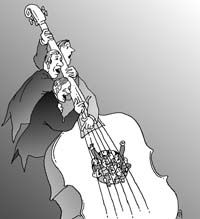A roundtable entitled “Politics in the Sphere of Culture: Partnership between the Creative Community and the State,” and organized by an initiative group of Kyiv-based cultural activists, was recently held at the Ukrinform premises on the memorable day when the new government was formed in the Verkhovna Rada.
The events taking place in Ukraine’ parliament were the reason behind the absence of the heads of the parliamentary Committees on Culture and Spirituality (Les Taniuk) and Freedom of Speech (Mykola Tomenko). Mr. Tomenko, who is now Deputy Premier for Humanitarian Issues, was in fact among the initiators of the roundtable meeting between writers, publishers, directors, actors, artists, composers, librarians, and journalists and the government authorities. However, in spite of Taniuk and Tomenko’s absence, the roundtable participants, keeping in mind the recent unity of the present authorities and the people on the Maidan, were hopeful that their concern for and reflections upon the fate of Ukrainian culture would be heard and considered on the political Olympus. Admittedly, these hopes are rather slender. At the end of the meeting, some of the discussants voiced their anxiety that now that yesterday’s “DJs,” “princesses,” and “voices” of the revolution have occupied ministerial chairs, they will become inaccessible to the millions of voters who brought them to power — not because the new ministers are unworthy of their posts, but simply because power is lethal to a reasonable and conscientious person’s conscience and common sense. Meanwhile, despite the skepticism that was nurtured under the former government, the Ukrainian cultural workers taking part in the roundtable convened by coordinator Serhiy Proskurnia gave the new government another vote of confidence and shared their opinions on the present condition of the Ukrainian culture. Trying to convince people that it is truly pitiable in every sphere was preaching to the converted. For instance, in more than ten years of independence book publishing has never become a business. As a result of the Ukrainian authorities’ lobbying of Russian capital’s interests, we have lost not only millions of dollars in revenue but also the reader’s respect for Ukrainian books, Ukrainian letters, and Ukrainian history and culture, said Leonid Finkelshtein, an ardent supporter of book publishing in Ukraine. Most libraries, with the exception of a few central and oblast ones that are maintained by enthusiastic staff, have been left to the mercy of fate and have ceased to carry out their primary function: being a source of various information for people. This situation was in fact convenient for the authorities, who kept the electorate in ignorance and manipulated it through the “one-eyed guru” [television], consisting mostly of lies and false information. As for Ukrainian cinema, the mass media has long been reporting on its present condition mostly in the form of epitaphs. One of Ukraine’s most promising directors Oles Sanin reminded the gathering that since this country has lost almost everything in the sphere of film production, it should now be supervised not even by the Ministry of Culture but the Security Service of Ukraine, because all modern means of influence on our people’s consciousness were long ago usurped by other countries, with Russian oligarchs in command of our cultural field and the mass media. The writer Oksana Zabuzhko agreed with him, declaring with her natural candor that Ukrainian artists are now in a ghetto, isolated from their people, who satisfy their cultural requirements only with 5-10% of the national Ukrainian product.
Mr. Sanin also suggested that the structure of the new executive power should be tailored so that culture and the arts will be independent of the minister’s personal tastes. This was the artists’ reasonable, conciliatory, and reserved response to pop singer Oksana Bilozir’s appointment as Minister of Culture and the Arts, which artistic circles did not meet with any enthusiasm (concerning classical and experimental spheres of culture, not popular ones). Although Ms. Bilozir’s political reputation is unsullied, the fact is that she has never been noticed in the most famous galleries of Kyiv, nor has she attended premieres or guest performances in top-notch theaters or non-commercial film festivals. This is confirmation of the new minister’s rather narrow range of cultural interests, which provides grounds for assuming that her understanding of the primary tasks in every kind of artistic sphere is equally limited.
The precise formulation of these tasks for the government’s benefit was the major goal of the roundtable, which established the necessary prerequisites for a future dialog between artists and the state: openness, competitiveness, public control, and transparency, and giving priority to the finest and most genuine academic examples of art, along with avant-garde experimentation that instills vitality into academism, which is prone to excessive conservatism.







